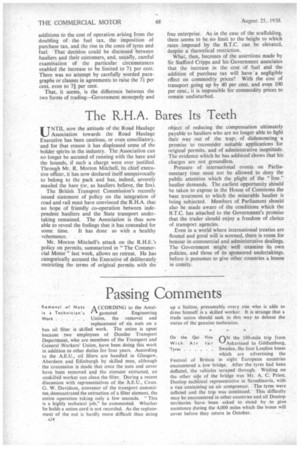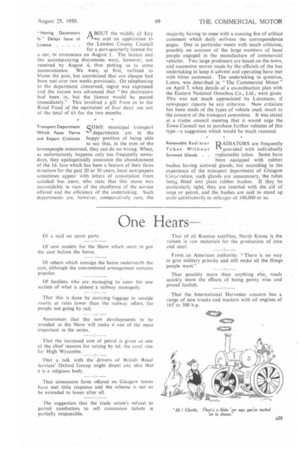Passing Comments
Page 26

Page 27

If you've noticed an error in this article please click here to report it so we can fix it.
Removal .of Nuts ACCORDING to the Amal i s a Technician's gamated Engineering Work Union, the removal and
replacement of six nuts on a bus oil filter is skilled work. The union is upset because two employees of Dundee Transport Department, who are members of the Transport and General Workers' Union, have been doing this work in addition to other duties for four years. According to the. A.E.U,, oil filters are handled in Glasgow, Aberdeen and Edinburgh by skilled men, although the concession is made that once the nuts and cover have been removed and the element extracted, an unskilled worker can clean the filter. During a recent
discussion with representatives of the E.U., Coun. G. W. Davidson, convenor of the transport committee, demonstrated the extraction of a filter element, the entire operation taking only a few seconds. "This is a highly technical job," he commented. Whether he holds a union. card is not recorded. As the replacement of the nut is hardly more difficult than doing
A24
up a button, presumably every one who is able to dress himself is a skilled worker. It is strange that a trade union should seek in this way to debase the status of the genuine technician.
On the Qui Vive nN the 180-mile trip from With Air for ‘-"Askarsund to Gothenburg, Tyres Sweden, the four London buses which are advertising the Festival of Britain in eight European countries encountered a low bridge. After the tyres had been deflated, the vehicles scraped through. Waiting on the other side of the bridge was Mr. A. C. Priest, Dunlop technical representative in Scandinavia, with a van containing an air compressor. The tyres were inflated and the trip was continued. This difficulty may be encountered in other countries and all Dunlop territories have been asked to stand by to give assistance during the 4,000 miles which the buses will cover before they return in October. ABOUT the middle of July
"Having Decorators In" Delays Issue of Licence
we sent an application to the London County Council for a part-quarterly licence for a car, to commence on August 1. The licence and the accompanying documents were, however, not received by August 4, thus putting us to some inconvenience. We were, at first, inclined to blame the post, but ascertained that our cheque had been met over two weeks previously. On telephoning to the department concerned, regret was expressed and the excuse was advanced that "the decorators had been in, but the licence would be posted immediately." This involved a gift from us to the Road Fund of the equivalent of four days' use out of the total of 61 for the two months.
Transport Department q0ME municipal transport Which Faces Fierce 1-1 departments are in the and Expert Criticism happy position of being able
to say that, in the eyes of the townspeople concerned, they can do no wrong. When, as unfortunately happens only too frequently nowadays, they apologetically announce the abandonment of the Id. fare which has been a feature of their fares structure for the past 20 or 30 years, local newspapers sometimes appear with letters of consolation from satisfied bus users, who state that this move was unavoidable in view of the excellence of the service offered and the efficiency of the undertaking. Such departments are, however, comparatively rare, the majority having to. cope with a running fire of critical comment which daily enlivens the correspondence pages. One in particular meets with much criticism, possibly on account of the large numbers of local people engaged in the manufacture of commercial vehicles. Two large producers are based on the town, and successive moves made by the officials of the bus undertaking to keep it solvent and operating have met with bitter comment. The undertaking in question, Luton, was described in "The Commercial Motor" on April 7, when details of a co-ordination plan with the Eastern National Omnibus Co., Ltd., were given. This was not much appreciated by Lutonians, if newspaper reports be any criterion. Now criticism has been made of the types of vehicle used, much to the concern of the transport committee. It was stated at a trades council meeting that it would urge the Town Council not to purchase further vehicles of this type—a suggestion which would be much resented.
Renewable Rad i at or no ADIATORS are frequently Tubes Without provided with individually Screwed Glands . . replaceable tubes. Some have
been equipped with rubber bushes having screwed glands, but according to the experience of the transport department of Glasgow Corporation, such glands are unnecessary, the tubes being, fitted into plain rubber bushes. If they be particularly tight, they are inserted with the aid of soap or petrol, and the bushes are said to stand up quite satisfactorily to mileages of 100,000 or so.












































































